- About Ramapo
- Academics
- Admissions & Aid
- Student Life
- Athletics
- Alumni
- Arts & Community
- Quick Links
- Apply
- Visit
- Give
Investigative Genetic Genealogy Center (IGG)
March 21, 2024A Day in the Life of a Full-Time IGG Practitioner
By Cairenn Binder
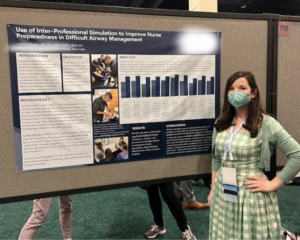
Cairenn standing in front of a poster in March 2022 during her previous career as a nurse educator.
Two years ago, I was working as a nurse educator in a community hospital, dreaming of the day I might be able to work full time in Investigative Genetic Genealogy (IGG). At the time, I practiced IGG on the side – both as a small business owner and with a nonprofit organization. As IGG is a still-growing field, I did not see an opportunity at the time to transition to full-time work in IGG.
A few months later, my life changed when I met Professor David Gurney, now my director at the Ramapo College IGG Center. We worked together to design sustainable programs which were bravely implemented by Ramapo College, and today we are two of the five staff members in the IGG Center.
Back then, I would have imagined that full time IGG work looked like this: sipping my coffee while spending the day solving cases and leading IGG teams to success. While I do indeed get to work on cases at the IGG center, a day in my life is a far cry from my imaginings two years ago. As Assistant Director of the IGG Center and Director of the IGG Certificate program, I have a lot more on my plate than casework. I believe it is similar for other leaders in the field of IGG who are employed full-time in the field. We are juggling casework, case management, fundraising, research, media, marketing and the endless minutiae associated with program management.
To give readers a taste of what a day in the life of an IGG practitioner looks like, I’ve sampled a few days from the past week to share.
Monday
7:00 AM – My day begins. Because my job encompasses both online and in-person duties including teaching classes online in the evening, I work from home some days. Today is a work from home day, so I begin early. My first task of the day is to read and respond to emails including questions from students, case management-related emails, exchanges about upcoming travel or conferences, and updates to forthcoming publications or media appearances.
9:30 AM – Curriculum updates. With the constant changes in IGG, our curriculum for the IGG certificate program requires updates every term. It is currently week 4 of the program, so I update the slides for both class days this week. Prof. Gurney is leading the classes today, so I spend some time discussing with him what each of us will teach this week. I also collaborate with our Case Manager to get students added to some resources they will need for upcoming coursework.
11:30 AM – Lunch, and I spend some time cleaning up all of the messes I made from traveling the past two weekends.
12:15 PM – Case management. We are looking at using a different genotyping method for some of our cases, so I send emails to various laboratories to obtain quotes for this service. I also exchange emails with a client who is working to confirm a suspect lead in a criminal case. Although our Case Manager performs most of the case-related tasks, there are some tasks that I am responsible for – especially when they elicit changes to our budget, case timeline, and curriculum.
2:00 PM – Casework. We have a difficult case with a dedicated team, and it’s a bit “stuck” due to recent immigration. I work on the chromosome map and find some triangulated segments that should be explored by the team.
3:00 PM – More emails! Sometimes, I describe my job as answering emails all day. That’s not really true, but I do spend a lot of time on e-mail. On this day, I am a bit backed up because I was traveling over the weekend, and replies from the emails I sent this morning now have landed in my inbox and need to be replied to. I try to keep my inbox cleared to under 50 emails (one “page” in Gmail). After this, my day is (mostly) finished – but I keep an eye out for important emails all the time!
6:00 PM – I learn one of our cases has been resolved and send an e-mail to the students who worked on the case to share the good news. I also provide a heads up to our Director of Communications & PR at Ramapo as this will likely be a big story.

Tuesday
8:20 AM – Today I am on campus and my day usually begins at 8 or 8:30. Of course, my first priority is to answer emails that came in overnight. I also email some of our speakers for the upcoming RIGG conference to obtain information that I need for social media and marketing of the conference. I also send a timeline of the recently-solved case to our Communications and PR Director.
10:00 AM – Social media updates. I like to get a few days ahead of our social media accounts by scheduling posts. I create some graphics for social media and get them scheduled for the coming week.
11:30 AM – Lunch at my desk – it’s a busy week!
12:30 PM – I virtually visit a high school forensics class to provide a presentation about IGG. They are a fun class and ask lots of great questions! Our team speaks at high schools, agencies and community organizations regularly in hopes of spreading the word about IGG and recruiting for our programs.
1:30 PM – Travel documents. We have some upcoming conferences which require approval. I spend some time filling out the required paperwork, booking airline tickets, and studying the event details, as well as creating marketing materials we will need.
3:15 PM – My work is done for the day (although I will still check my email through the evening). Some days I work 12 hours, some days I work 6 hours. As my Dean has described, my schedule is “elastic” because of the unique needs of our department.
Wednesday
8:00 AM – I’m on campus again today, and as usual my day begins with unpacking my inbox.
9:00 AM – Conference things. I have to update the schedule for RIGG, create social media posts about newly added speakers, exchange emails with vendors, and file paperwork. Conference planning is no small task – it is probably one quarter of my work!
11:00 AM – I attend a committee meeting for the College. Although most of my work is in the IGG Center, I frequently get to collaborate with other departments at Ramapo and engage with goings-on on campus.
12:00 PM – Today I forgot my lunch, and campus is closed for Spring break so options are limited! I manage to obtain some avocado toast from the cafeteria.
1:00 PM – I receive a phone call from an agency, and exchange emails with some laboratories to facilitate the needs of the agency.
2:00 PM – Meeting with a vendor to discuss a grant application.
3:00 PM – Grant writing. One of the most painful parts of the job (is there anyone who enjoys grant writing?) but this is a highly necessary skill and we are always seeking new funding opportunities at the IGG center!

Thursday
This is a bit of a cheat, since it’s Thursday at 9:17 AM right now! However, this is what I expect my day will look like.
6:30 AM – I update the IGG Center cases page with some new cases we have recently taken on.
7:30 AM – Inbox unpacking and scheduling social media posts.
8:30 AM – I notice it has been awhile since we have posted a blog, so I decide to write this one! Bonus, when I update the blog I will be able to update our social media as well!
11:00 PM – I am providing a talk about IGG at a museum in New Jersey. I hope that this will be a good opportunity to share the work we are doing that directly impacts agencies in New Jersey.
1:00 PM – I will teach our daytime IGG Certificate Program Class.
2:30 PM – I will finish unpacking my inbox, make sure our social media is all set, and set my out of office email for next week – I’m going on vacation!
7:00 PM – I will teach our evening IGG Certificate Program Class.
As you can see, there is very little time that I have the opportunity to focus specifically on casework. Thankfully, our cases are frequently cleared by the work of students in our programs, and volunteers both on campus and online. Still, when I want to I do get to build trees, perform segment analysis and create reports – I just have to find the time!
I hope this provides some insight into what a day in the life of an IGG practitioner looks like. To learn more about careers in IGG, be sure to check out our panel discussion at RIGG:

Categories: careers, practitioner tips, RIGG
March 1, 2024RIGG 2024: Insider Tips for a Seamless Experience
By Tracie Boyle
The Ramapo Investigative Genetic Genealogy Conference (RIGG 2024) will be here before we know it. To help you get prepared and know what to expect, I wanted to share some helpful tips.
As a local, I had the option to commute, but staying on-campus last year proved incredibly convenient with everything centralized. Sessions and events were just a 5-10 minute walk away, meals were provided, and it provided ample opportunities to connect and mingle with fellow attendees late into the evenings in the residence hall common areas, swapping stories and experiences. I’m looking forward to those memorable moments again this year!
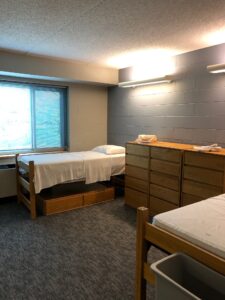
If you choose to stay on campus during the conference, you’ll be in Bischoff Hall. Each room has two extra long twin beds (don’t worry, you won’t have a roommate – all rooms are private during the conference!), a large desk, chair, bookshelves, closets, and a private bathroom. They are also equipped with air conditioning, a microwave, mini-fridge, and Wi-Fi access. However, please note that televisions are not provided. But hey, who needs TV when you’ve got all this excitement around you, right?
If you’re curious about what the rooms look like, feel free to check out some 360° images of the rooms here.
Additionally, the building offers lounges on each floor, vending machines, complimentary laundry facilities, and nearby parking. There are seating areas, both indoor and outdoor, in the residence halls.
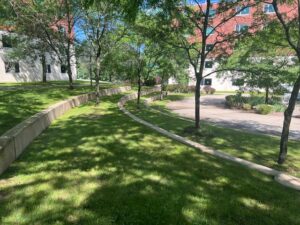
With all these features, you’re in for a convenient and comfortable stay. However, it’s not the same as a hotel – you may benefit from bringing a few creature comforts along:
- Comfortable clothes and walking shoes for sessions during the day. The Ramapo campus is beautiful, although hilly, but also fully accessible.
- For the evening Dinner/Receptions (Friday & Saturday), it might be a good idea to pack some dressier attire, but full formalwear isn’t necessary.
- Extra phone chargers and power banks to keep your devices charged.
- Snacks and a reusable or collapsible water bottle (water refill stations available).
- While coffee is provided with breakfast and available for purchase in The Atrium, please note that Dunkin Donuts and Common Grounds may not be open during this year’s conference. If you’re someone who loves coffee as much as I do, think about bringing your own Keurig, personal brewer, or instant coffee.
- Toiletries, including shampoo, conditioner, toothpaste, mouthwash, etc.
- Linens are provided in each room, but the towels are on the small side – these packable towels fit easily in your suitcase without taking up too much space.
- Hair dryer, straightener, or curling iron if needed for styling.
- Consider bringing your preferred type of toilet paper if you’re particular, although toilet paper is provided..
- Earplugs or an eye mask for better sleep if you’re sensitive to noise or light.
- Medications and first aid supplies, such as bandaids, that you may need.
- Laptop/tablet and chargers if needed for note-taking.
- Small portable fan or extra blanket based on your temperature preferences.
- Personal items for productivity and comfort during the conference (notebook, pen/pencil, business cards, etc.).
No need to stress if you forget something! You’ve got convenient options nearby with Acme, ShopRite, and Walmart just a quick 10-minute drive away, or easily accessible via rideshare. Plus, the Student Center might also be open for any last-minute necessities.
And since there will be downtime in the evenings, consider bringing along a card game or another travel-sized game to keep the fun going. How about a lively game of Murder We Wrote with your newfound friends in the lounge?
If you have any other suggestions, tips or questions, please feel free to leave them on our social media posts on Facebook or Twitter/X.
We can’t wait to welcome you to RIGG 2024! Wishing you a safe travels, and we’re looking forward to seeing everyone soon!! Tickets are selling fast and dorms are only available through March 31 – reserve your spot now!
Categories: RIGG
February 16, 2024Memories of RIGG 2023, and the Countdown to 2024
by Cairenn Binder
Before I was hired by Ramapo College to assist in launching the IGG center, I sat down with (now my Director) Professor David Gurney to write down a list of potential goals. Our primary mission was to develop educational opportunities for applied learning of investigative genetic genealogy, but we brainstormed further and created an extremely ambitious list. We wrote down things like, “Latin American DNA Project”, “experiential fundraising opportunities”, and “hold a conference for IGG”. Looking at the list later that day, I thought it sounded impossible.
Amazingly, all of the things on the list came to fruition – including the conference.
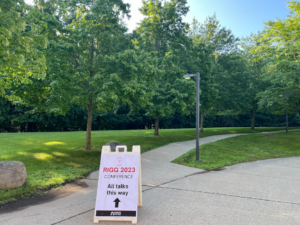
“The path of enlightenment” from the RIGG residence halls to the presentation rooms.
The inaugural Ramapo College Investigative Genetic Genealogy Conference (RIGG) was held in July of 2023, and it was no easy feat to pull off. While we had the facilities and the infrastructure to hold a conference here on the Ramapo Campus, the rest of it was work we needed to do on our own. This included outreach to potential speakers, promotion of the event on social media, creation of marketing materials and signage, and countless logistical minutiae like applying for alcohol permits and selecting menu items. It was hard work, but we made it happen.
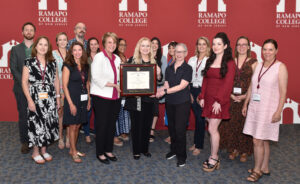
Ramapo IGG alumni and staff with Honorary Doctorate Recipient CeCe Moore at RIGG 2023.
We were honored by the presence of keynote speaker CeCe Moore, who brought the house down with her incredible presentation and was deservedly awarded an honorary doctorate degree by Ramapo College for her contributions to the field of IGG. Her early support of the event made it an incredible success.
Two dozen other speakers presented talks about all aspects of IGG, including case studies, innovations in the field, law enforcement perspectives, laboratory advances, and more.
The event was not without its trials – I am fairly certain that I was unpleasant to be around during the final weeks of preparation, as it was incredibly stressful! A heat wave and thunderstorms threatened to strip the fun out of our planned outdoor activities. Technical difficulties during livestreamed talks drew many negative comments from online attendees. A controversial presentation on the final conference day added a layer of uncertainty and discord to an already difficult time.
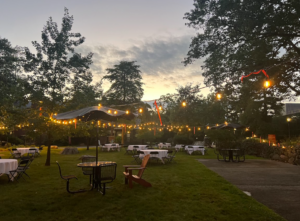
Summer camp – for IGG practitioners!
However, looking back on RIGG 2023, I remember it as a triumph. In less than a year, our team of two put together a memorable event that brought together nearly 150 IGG practitioners and related professionals. After Dr. Moore’s keynote speech, the rain subsided and our attendees enjoyed music, drinks, and great conversation outside by the Ramapo Arch – complete with fireflies and lawn games! Seeing our former students, friends and colleagues from around the world gathered together at Ramapo was an unforgettable experience.
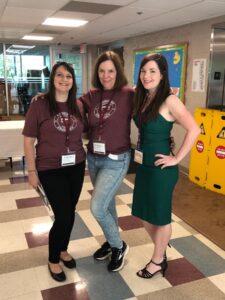
IGG Staff and Volunteers Monique Platt, Diana Jeffrey and Cairenn Binder.
If you took a photo with one of our disposable film cameras last year, stay tuned – those photos are coming soon!
Now we begin the countdown to RIGG 2024, and we hope to see you there June 28-30, 2024. Avoid FOMO – get your ticket before they’re gone!
Copyright ©2025 Ramapo College Of New Jersey. Statements And Policies. Contact Webmaster.

Follow Ramapo